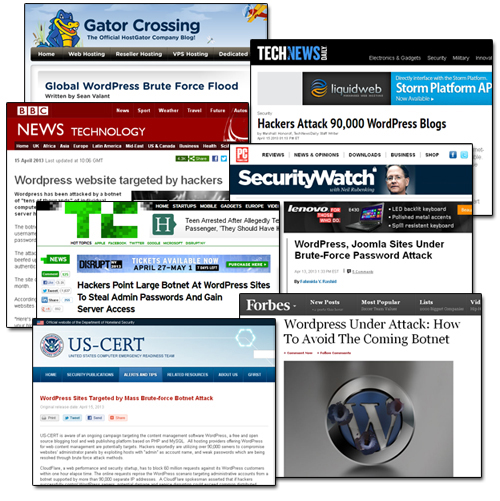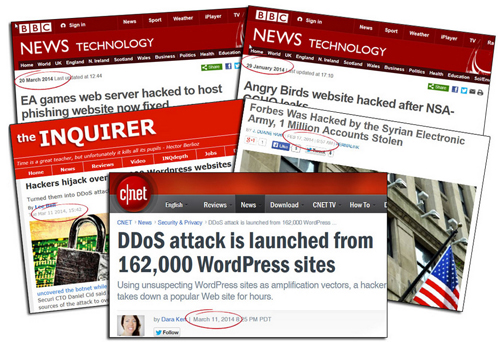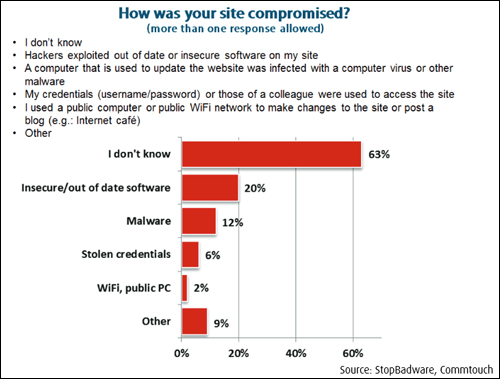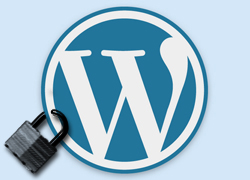 In April 2013, WordPress installations around the world were subjected to a worldwide brute force attack.
In April 2013, WordPress installations around the world were subjected to a worldwide brute force attack.
These attacks were caused by networks of infected computers programmed to attack other computers (botnets).
(WordPress often is targeted by hackers)
In March 2014, technology sites like Cnet.com reported that 160,000+ WordPress-powered web sites had been hacked.
(Over 160,000 WordPress sites were attacked in a massive DDoS attack in early 2014. Image: BlogDefender site)
According to the Cnet report,
“With some old-fashioned trickery, hackers were able to get more than 162,000 legitimate WordPress-powered Web sites to mount a distributed-denial-of-service attack against another Web site.”
(Source: cnet.com/news/ddos-attack-is-launched-from-162000-wordpress-sites)
According to leading security firm Sucuri, hackers had leveraged a flaw to attack unsuspecting WordPress web sites and direct a distributed-denial-of-service cyber attack (DDoS) towards another popular website.
Whenever attacks on WordPress sites happen, it’s natural for people to ask if WordPress really is a safe software for building and running an online presence.
WordPress powers millions of websites and blogs worldwide, which makes it a target for attempted hacker attacks. But should you really be concerned about WordPress as a secure platform for building your business website?
In this article, you will learn some of the main reasons why you should definitely use WordPress if you have any concerns about website security.
WordPress Security Explained
Let’s start by looking at facts …
Thousands of websites and blogs are hacked every year … not just WordPress sites!
The sheer number of attacks on websites and blogs worldwide is massive, and it’s only going to get worse.
It’s safe to assume that if you haven’t been hacked yet, then it’s only a matter of time before someone attempts to hack into your site … regardless of the web platform your website has been built with!
Since it’s no longer a matter of if, but a matter of when before your website is targeted by hackers, are there any advantages that WordPress can offer you in terms of security?
How Secure Are “Open Source” Software Applications?
Many people often argue that WordPress cannot be a secure platform for building and running a website or blog because its “open source” code is freely available.
Open source CMS platforms like WordPress, Drupal and Joomla are free to use and anyone has access to the entire underlying code.
The argument against WordPress, then, goes something like this: If everyone can study the Open Source code for WordPress, then hackers can also easily get hold of all of the code and study it in detail, searching for holes and weaknesses in the code that can be exploited …

(It’s no longer a matter of if, but a matter of when before a malicious user tries to hack your website … WordPress or no WordPress!)
While it’s true that WordPress is free and hackers can easily go through the code searching for security holes or vulnerabilities that can be exploited (hackers can do the same with any software application), the fact that WordPress is a free, open-source application actually makes it more secure in several ways.
This is because WordPress has the support of an open community that consists of hundreds of people such as software programmers, plugin developers and theme designers who are constantly working to help to improve the program and make WordPress more secure …
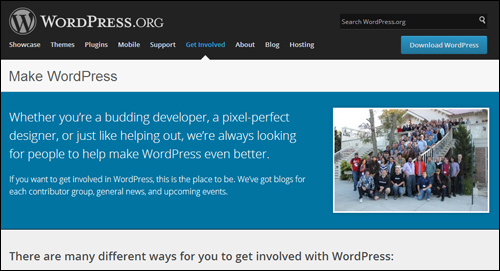
(With WordPress, a global volunteer community of developers is responsible for keeping the core application updated. Screenshot source: WordPress.org)
WordPress evolves through the effort of a huge volunteer community working around the clock to fix issues. Everyone benefits from thousands of individuals dedicated to improving the software, fixing bugs and making WordPress safer for every user …
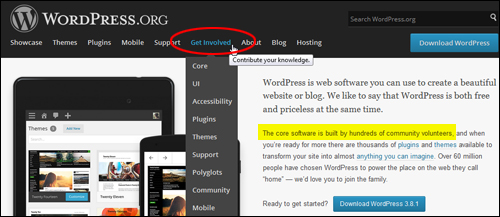
(The WordPress core software is built and maintained by a large community of volunteer members. Image source: WordPress.org)
As soon as security problems are identified by developers or users, the WordPress core development team are then notified …
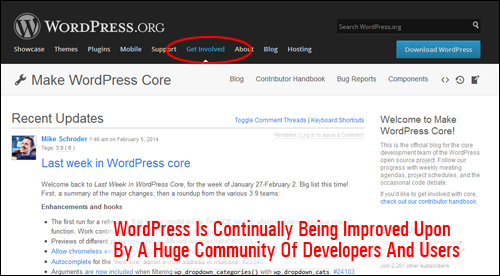
(WordPress is continually being improved upon by an open community of users and web developers. Source: make.wordpress.org)
The WordPress community support system, therefore, is quite formidable and anybody can help contribute to the process of addressing security issues.
For example:
- If you come across bugs or security exploits, you can report these by emailing security@wordpress.org.
- If you find any issues in a WordPress plugin, you can also report these by emailing plugins@wordpress.org.
This is the reason why WordPress releases new version updates so frequently, and why you need to keep your WordPress sites and blogs frequently up-to-date …
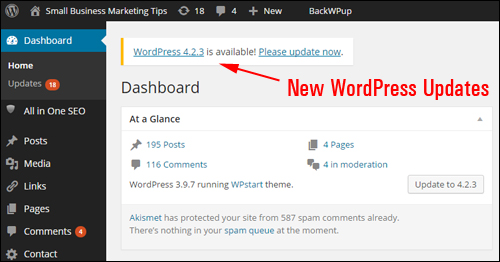
(WordPress frequently releases new version updates to plug any security vulnerabilities found)
WordPress CMS Vs Proprietary CMS Platforms
Contrast the benefits of using an open source CMS technology like WordPress with proprietary CMS platforms where often the responsibility for maintaining software security, fixing bugs, etc. falls to a much smaller team of developers with limited resources and you will very quickly understand the value and advantages of using WordPress to run your websites and blogs on a secure platform.
The WordPress CMS is 100% free to download, modify and use, and hundreds of volunteers and expert developers work on improving the technology. Can a proprietary CMS company afford to employ as many developers and programmers and still deliver users software that is 100% free to download, use and modify as they wish?
WordPress CMS Vs Other Open Source Platforms
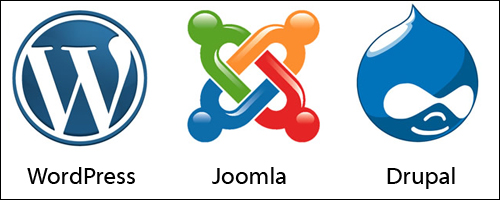
(CMS Platforms include WordPress, Joomla and Drupal)
Whilst on the topic of Open Source content management applications, there is valid research showing that WordPress is safer than other Open Source CMS platforms like Drupal and Joomla.
For example, the chart below shows the number of security vulnerabilities found in popular CMS platforms …
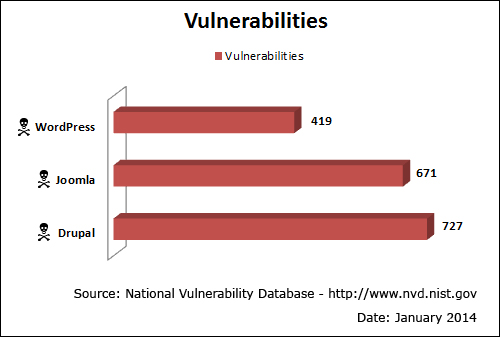
(National Vulnerability Database – Security Vulnerabilities IN CMS Applications. Source: National Vulnerability Database)
Other studies indicate that, because WordPress is quite easy to use and to maintain, when sites across different CMS platforms were tested for security vulnerabilities, WordPress sites had significantly less exposure to risk …

(WordPress is more secure than other leading CMS platforms. Screenshot image: BlogDefender.com)
The WordPress CMS Is Not To Blame
When WordPress sites get attacked en masse, don’t be too quick to place the blame on WordPress.
According to a nonprofit organization that helps webmasters identify, remediate and prevent website compromises called StopBadware and security vendor Commtouch in a published report entitled “Compromised Websites: An Owner’s Perspective“, many website owners are not fully aware of the threats their websites are exposed to, how to secure a website, or deal with compromised web security.
In fact, over sixty percent of webmasters surveyed for the report didn’t know how their sites had been compromised by hackers after an attack …
(Most webmasters don’t even know how their sites get hacked. Screenshot: StopBadware.org)
Of more immediate concern is the fact that most security-related issues come from users running sites with an outdated version of WordPress …
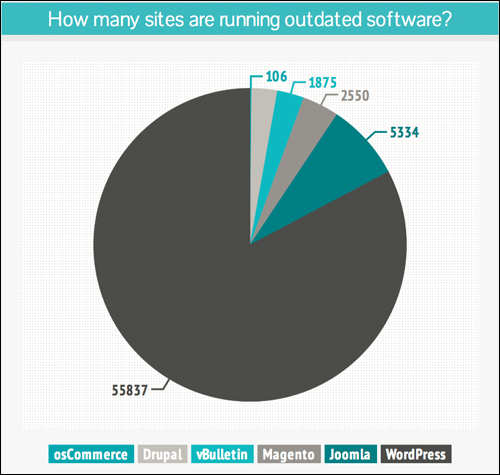
(Many WordPress sites use outdated versions. Screenshot: Sucuri.net)
When WordPress security issues were looked at in more detail, it was found that only between 20% – 30% percent of vulnerabilities discovered in third-party code are actually found in the WordPress core software, while most security issues are found in plug-ins and extensions …
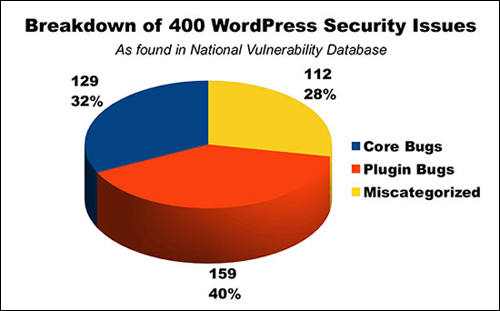
(WordPress Security Issues. Image source: WebDesign.org)
Like many modern software platforms, WordPress is updated regularly to address new security threats that may arise. Improving security is an ongoing concern, and to that end, you should always keep up to date with the latest version of WordPress.
WordPress … Secure Enough For Banks To Use!
The amount of misinformation online about WordPress security has even caused Matt Mullenweg, the co-founder of WordPress, to chime in and reply to posts online.
In an article entitled “A Bank Website on WordPress” published on April 15, 2015, Matt wrote the following about WordPress security …
There’s a thread on Quora asking “I am powering a bank’s website using WordPress. What security measures should I take?” The answers have mostly been ignorant junk along the lines of “Oh NOES WP is INSECURE! let me take my money out of that bank”, so I wrote one myself, which I’ve copied below.
I agree there’s probably not a ton of benefit to having the online banking / billpay / etc portion of a bank’s website on WordPress, however there is no reason you couldn’t run the front-end and marketing side of the site on WordPress, and in fact you’d be leveraging WordPress’ strength as a content management platform that is flexible, customizable, and easy to update and maintain.
Matt then goes on to provide a couple of security tips, before stating the following …
For an example of a beautiful, responsive banking website built on WordPress, check out Gateway Bank of Mesa AZ. WordPress is also trusted to run sites for some of the largest and most security-conscious organizations in the world, including Facebook, SAP, Glenn Greenwald’s The Intercept, eBay, McAfee, Sophos, GNOME, Mozilla, MIT, Reuters, CNN, Google Ventures, NASA, and literally hundreds more.
As the most widely used CMS in the world, many people use and deploy the open source version of WordPress in a sub-optimal and insecure way, but the same could be said of Linux, Apache, MySQL, Node, Rails, Java, or any widely-used software. It is possible and actually not that hard to run WordPress in a way that is secure enough for a bank, government site, media site, or anything.
Millions of businesses, including banks, large organizations and e-commerce sites choose WordPress to build their websites, not just bloggers.
Other Factors That Can Affect Security
Other studies on issues that affect WordPress security point to factors such as:
- No platform is protected from security threats. As many as 90% of all websites across all platforms are vulnerable to attack, mostly due to using software that is out of date.
- The biggest security risk in all content management systems seems to be the users themselves. An example of this is users ignoring strong password security practices.
- Lack of constant monitoring. All security processes need frequent monitoring, testing, updating and improvement.
- Server setup. For example, sites on shared webhosting servers are only as secure as the least safe site on the hosting grid, so if someone else has a weak FTP password on your shared server, then every site on that shared server is potentially vulnerable to hacking as well.
There’s No Reason Not To Choose WordPress
As you can see, WordPress is quite secure. As long as you continue to implement basic web security measures and keep your WordPress software (and plugins, themes, etc.) regularly up-to-date, there’s really no reason why you shouldn’t choose WordPress.
![]()
WordPress Security – Useful Tips
To learn about ways to protect your WordPress site from brute force attacks see this article: 10 Security Measures That Can Help To Prevent Brute Force Attacks On Your WordPress Website
A compromised blog offers malicious users with a resource to launch denial of service attacks, spread malware and use your website to defraud online users. Blog Defender WordPress Security Plugin makes your WordPress site invisible to hackers and bots. Learn more about it here:
If you are currently using an older version of WordPress make sure to make a complete backup before updating your software to protect your site from the latest security threats. This way, if things don’t go as planned, you can always restore.
If you don’t want to back up your site manually, there are a number of plugins you can use. Learn about a WordPress backup plugin that can fully automate your backup process here: Back Up, Copy & Protect Your WordPress Sites With Backup Creator WP Plugin
![]()
References
The above statistics were sourced from the following sites:
- ITProPortal.com
- National Vulnerability Database
- BlogDefender.com
- UpAndUpStudios.com
- StopBadware.org
- Sucuri.net
- WebDesign.org
- Quora.com
- Ma.tt
Hopefully, this post has given you a better understanding of issues that can affect your web site and how WordPress can help you build a better business online. To learn more about the security benefits of using WordPress for a business web site please click on links to visit our related posts section or subscribe to receive updates and notifications when new content is published.
***
"I have used the tutorials to teach all of my clients and it has probably never been so easy for everyone to learn WordPress ... Now I don't need to buy all these very expensive video courses that often don't deliver what they promise." - Stefan Wendt, Internet Marketing Success Group
